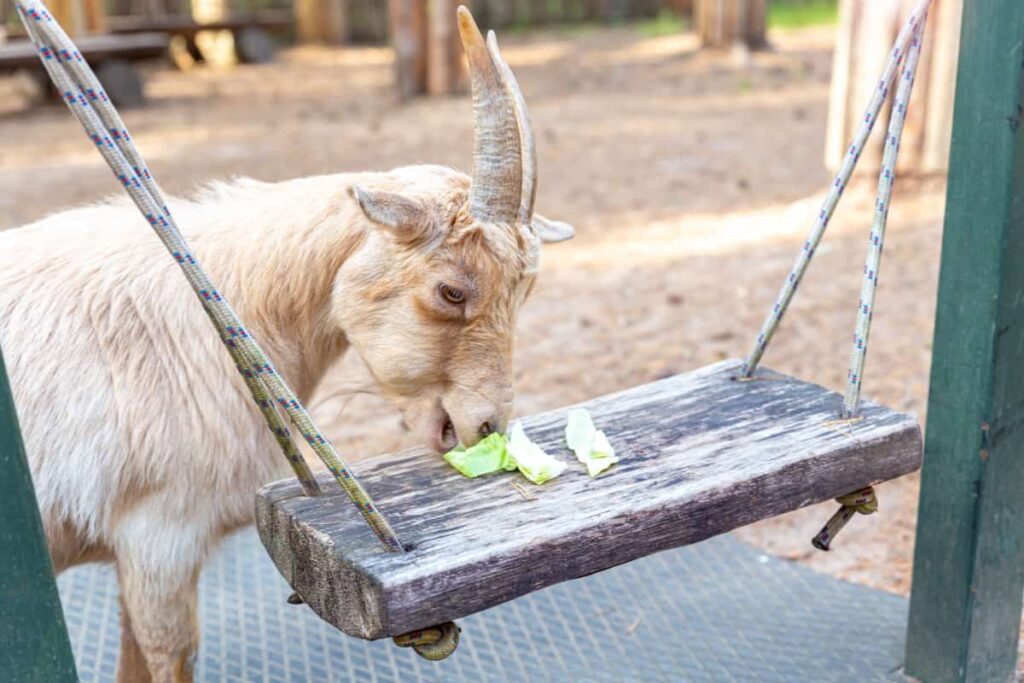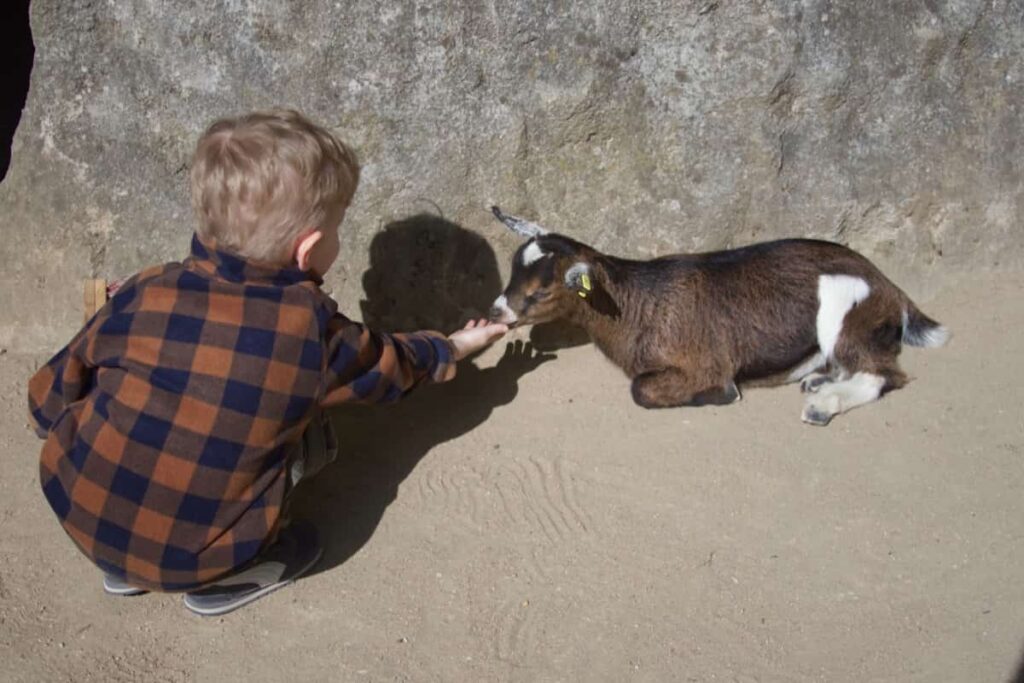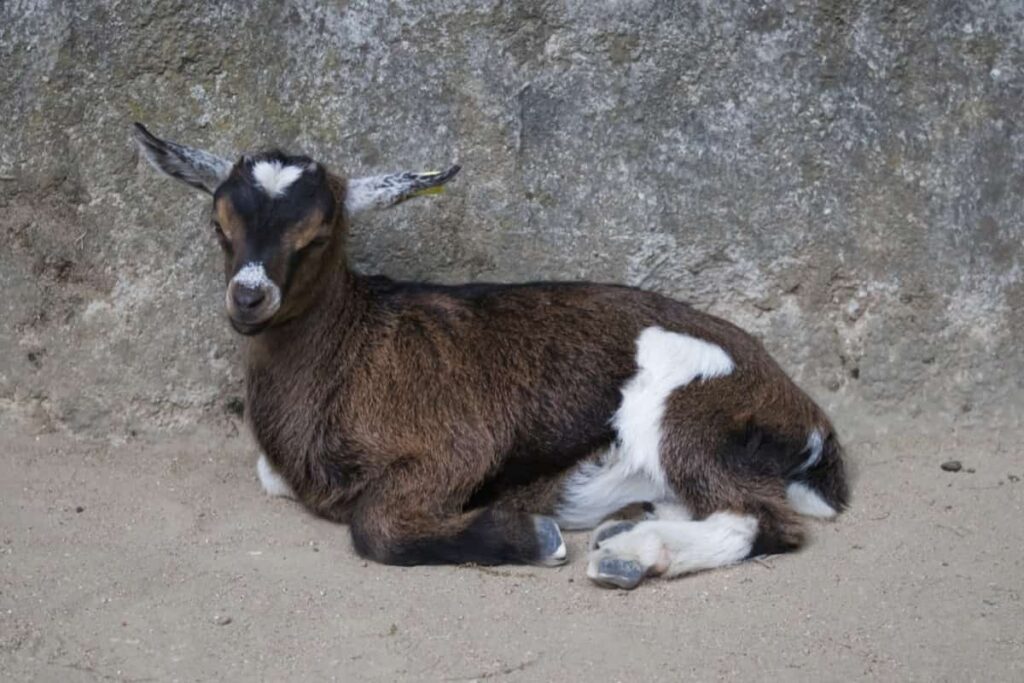African Pygmy goats are a popular breed of miniature goats well-suited for farming and backyard pet keeping. They are known for their lively and friendly personalities, hardy constitution, and ease of care. However, proper Pygmy goats care and management is crucial to ensure their health and well-being like other livestock. This comprehensive guide will provide valuable information on the housing, nutrition, health, breeding, and training of African Pygmy goats, making it an essential resource for anyone interested in raising these delightful creatures.

Raising African Pygmy Goats
African Pygmy Goat Characteristics & Uses
- African Pygmy goats are a breed of small domestic goats that originated in West Africa.
- African Pygmy goats come in various colors and patterns, with short, glossy coats and straight or slightly curved horns.
- Male African Pygmy goats are called bucks, and females are called does, with heights ranging from 16 to 23 inches.
- On average, males weigh about 27 to 39 kg, while females weigh around 24 to 34 kg or Does 53–75 pounds bucks 60–86 pounds (27–39 kg).
- They come in dark caramel, red caramel, and white caramel colors, as well as light-grey agouti, dark-grey agouti, and medium-grey agouti.
- African Pygmy goats are also used for their milk and meat, which are rich in nutrients and have a distinct flavor.
- Due to their small size and adaptability, African Pygmy goats can thrive in various environments, from rural farms to urban backyards.
- They are hardy and resilient animals that require minimal care, making them an ideal choice for beginners.
- African Pygmy goats are also used for weed control in vineyards and orchards, as they can graze on weeds and unwanted vegetation without damaging the crops.
- These goats are easy to train and can be taught to perform various tricks, making them popular in petting zoos and animal therapy programs.
Important Facts About African Pygmy Goat
- Pygmy goats have short legs, a well-muscled stocky body, a broad and deep barrel, and short limbs and heads relative to body length.
- The head has a dished profile, a broad forehead, erect ears, goat wattles, horns, a short, wide, flat nose, and a rounded muzzle.
- The coat is straight, medium-length, and varies in density with season and climate.
- Does have sparse beards, while bucks have long flowing beards and manes, and are bulkier with thicker horns than females.
- Pygmy goats and West African Dwarfs are precocious and prolific non-seasonal breeders, with estrus occurring at any time of year.
- Puberty is common at four to five months and can produce 1–4 young every 9–12 months, with twin births being common.
- It is recommended to wait until a doe is 12–18 months old before breeding.
- Pygmy goats have a lifespan of 10–15 years.
- Bucks can grow up to 23 inches (58 cm) in height, while does can grow up to 22 inches (56 cm) in height.
- Adult pygmy goats can weigh between 53–75 pounds (24–34 kg) for does and 60–86 pounds (27–39 kg) for bucks.
- Pygmy goats are docile, responsive, gregarious, friendly, good-natured, alert, animated, active, and fun-loving.
- They need an enriched environment and love to play.
In case you missed it: Innovative Housing and Shelter Designs for Profitable Goat Farming

Housing and Fencing in African Pygmy Goat Farming
- Provide a safe and secured shelter built on an elevated area to protect them from rain and cold winters.
- Build a strong fence around the house to keep external predators out.
- Allocate good space for easy movement within the house and use raised wooden platforms.
- Use a cement floor covered with dry hay or paddy husk, and arrange for coolers and heaters depending on the climate and season.
- Clean and disinfect the house frequently and ensure good cross-ventilation and airflow.
- Avoid using barbed wires for fencing and provide enough space for them to wander around.
- Use concrete floors with high wooden platforms to create a ventilated, draft-free housing system.
Nutrition and Feeding in African Pygmy Goat
- Feed your African pygmy goat little grains at least three times a week. They require a balanced diet with enough greens, vegetables, fruits, and leaves.
- Alfalfa, alfalfa cubes, and prairie hay are good roughage sources for African pygmy goats. They also enjoy eating tree leaves and bark.
- Always provide fresh water, which is essential for their overall health and well-being.
- Please do not feed your African pygmy goat houseplants, bulb plants, onions, oleander, rhododendrons, or other harmful plants, as they can be poisonous.
- Provide a mineral supplement to ensure that your African pygmy goat is getting all the essential nutrients they need.
- Offer them a salt block, which helps to balance their electrolyte levels and provides them with the necessary minerals.
- Avoid overfeeding your African pygmy goat, as they are prone to serious health problems.
Tips for Health and Wellness in African Pygmy Goats
- Provide them with good-quality feed and clean water.
- Keep their living area clean and dry.
- Ensure that they have access to weather protection.
- Monitor their health and behavior regularly.
- Provide them with proper vaccinations and deworming treatments as recommended by your veterinarian.
Common Diseases That Affect Pygmy Goats
- Caprine Arthritis Encephalitis (CAE)
- Caseous Lymphadenitis (CL)
- Enterotoxemia
- Footrot
- Pneumonia
- Tetanus
Breeding African Pygmy Goats
- Pygmy can start breeding as young as two months old, but it is best to wait until they are mature enough, typically around 7-10 months old.
- Pygmy goats are polyestrous, meaning they come into heat regularly throughout the year, so you must carefully manage their breeding schedule.
- When a doe is in heat, it exhibits certain behaviors, such as tail flagging, discharge, and seeking out a buck.
- Pygmy goats are prolific breeders and can give birth to 2-4 kids every 9-12 months.
- Bucks should be kept separate from does to prevent unwanted breeding and to keep them from putting undue strain on fences.
In case you missed it: Goat Breeding and Genetics for Improved Productivity and Disease Resistance

Conclusion
These miniature goats can be healthy and productive with proper care and attention, providing milk, meat, fiber, and companionship. By following the guidelines for feeding, breeding, and health care, anyone can successfully raise and care for African Pygmy Goats.
- Goat Milking Practices and Equipment: A Beginner’s Guide
- Goat Farming for Fiber: Producing Mohair and Cashmere
- Maximizing Goat Milk Production: Tips for Dairy Goat Farmers
- Goat Farming as a Family Business: Strategies for Success
- Profitable Kenya Goat Breeds for Commercial Dairy and Meat Business
- Unlock the Secrets of Oberhasli Goat: Discover Raising and Management Practices
- Ultimate Guide to Myotonic Goats: Explore Profile to Raising
- Unlock the Secrets of Rove Goat: Discover Management Practices
- Ultimate Guide to Malwa Goat: Explore from Origin to Management Practices